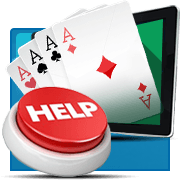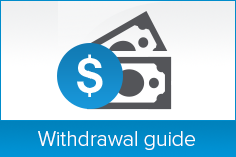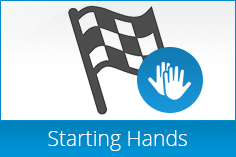Responsible Gambling
Online poker is a fun, accessible game that is easier to play than ever before.
And while playing a few hands of Texas Hold'em or a couple of SNGs for cash is about as much as most casual gamblers manage every day or so, for others gambling can get out of hand.
Yes, online poker - for all its 'skill game' promoters - still has enough of a gambling element for it to be open to players who are prone to problem gambling issues.
If you think you may have a problem with playing poker and gambling, we have a guide to spotting the telltale signs and how to get some help.
On this page you’ll learn all about:
- What ‘problem gambling’ means
- How to check your own betting habits
- Ways to keep gambling fun

What’s on
this page?
What is Problem Gambling?
Problem gambling is an illness where sufferers have a compulsive urge to continue gambling, regardless of the impact on their finances, health or friends and family. Severe problem gambling can be diagnosed as pathological gambling if serious enough.
According to research by the Royal College of Psychiatrists in the UK, problem gambling affects around 9 people in every 1,000. However, the college finds, another 70 are in a position where developing problems could become a problem. [1]
While traditional betting games like roulette and video poker have usually been cited as games played by problem gamblers, online poker players can still be victims.
How Can You Recognize If You Have a Problem?

There are various signs that you may have a gambling problem. If you spend a lot of time thinking about online gambling, spend money outside your means, or find yourself unable to stay away from poker sites on your PC or laptop, your poker playing may be an issue.
Problem gamblers will become good liars - both to themselves and to loved ones - and sufferers can end up in huge debt, in jail, or - in some extreme cases - dead.
The First Steps - Helping Yourself
There's not always a need to go to friends or a professional body if you think your gambling is getting out of hand.
Setting a simple limit on your poker play each week can help you be disciplined. Think about cancelling your credit cards and keeping a separate account just for gambling. Once it hits zero, stop playing and start building up the bankroll again. Meanwhile, any winnings you have can be withdrawn and put in an account where the cash is less accessible.
Also keep a log on how many hours per week you're spending online playing poker. Set a time limit and stick to it. More importantly, wean yourself off those "I'll just have another hand" moments.
Finally, always remember that poker is a fun pastime. For a minority it's a serious profession, but poker is a tough game to make a living out of. If you treat poker as a treat for a couple of hours every night after work, it's easier to treat gambling as "entertainment" rather than anything more serious.
The First Steps - Seeking Help
If you are playing poker at stakes way above your comfort level, you fill your time playing poker when bored, and find it hard to stop when you're on a downswing, it could be time to look for help.
Luckily, there are plenty of places you can seek help.
At first, this can be as simple as confiding in a partner, friend or family member. But if you are looking for more professional help, there are lots of organizations available to seek help from. (See boxout for a good list.)
Gamblers Anonymous employs a good 12-step programme for problem gamblers, while Gamcare runs a national helpline and provides face-to-face care.
You can often find helpful links to organizations on the homepage of most major poker rooms.
How Are Poker Sites Responsible?
Licensed poker sites in regulated jurisdictions often employ corporate social responsibility (CSR) where they both adhere to licensing frameworks but also conduct their own reviews into how they can protect players better.
Major sites will offer a self-exclusion option for players wanting to cut themselves off from the games, as well as forced deposit limits and 'stop-loss limits' so that players can't deposit more than they can afford.
Some sites will also donate to gambling charities and work with problem gambling bodies to see how they can improve the relationship between poker rooms and problem gamblers.
Helpful Resources
US - National Council on Problem Gambling: http://www.ncpgambling.org/; Gamblers Anonymous: http://www.gamblersanonymous.org/ga/;
UK - GamCare: www.gamcare.org.uk; Gamblers Anonymous: www.gamblersanonymous.org.uk; NHS Problem Gambling Clinic: http://www.cnwl.nhs.uk/services/addictions-and-substance-misuse-services/national-problem-gambling-clinic/
Australia - Commonwealth of Australia: http://www.problemgambling.gov.au/; South Australia: http://www.problemgambling.sa.gov.au/; Gambling Help Online: http://www.gamblinghelponline.org.au/;
Canada - Institute of Ontario Centre For Addiction: http://www.problemgambling.ca/Pages/Home.aspx; Responsible Gambling Council: http://www.responsiblegambling.org/; British Columbia Problem Gambling Information: 1-888-795-6111;
South Africa - National Responsible Gambling Programme: http://www.responsiblegambling.co.za/; National Gambling Board: http://www.ngb.org.za/organisational-areas/national-responsible-gambling-programme/responsible-gambling.aspx



